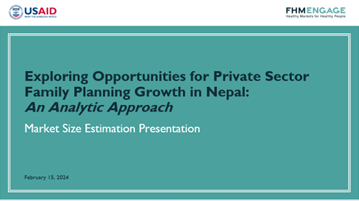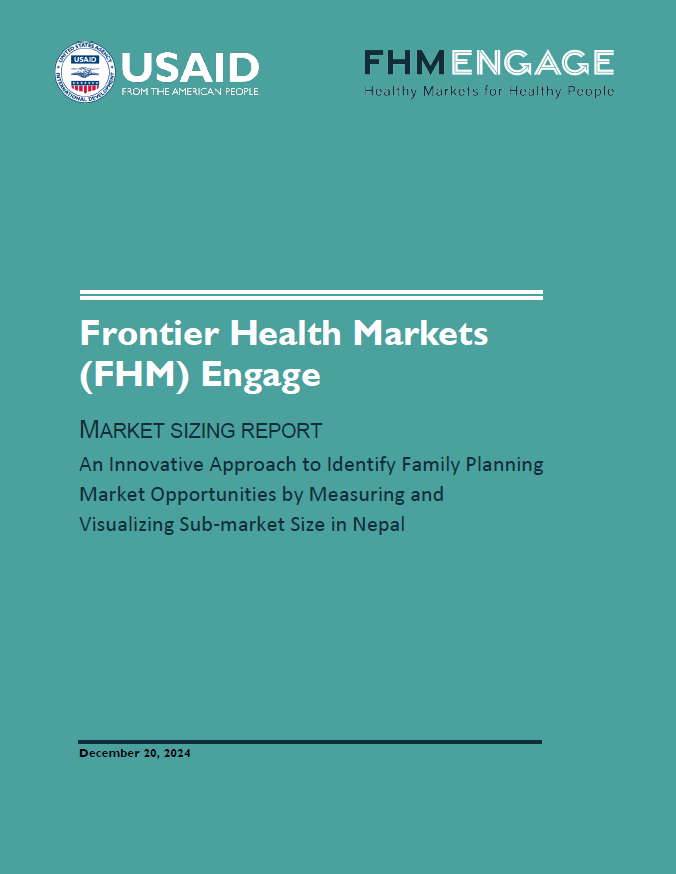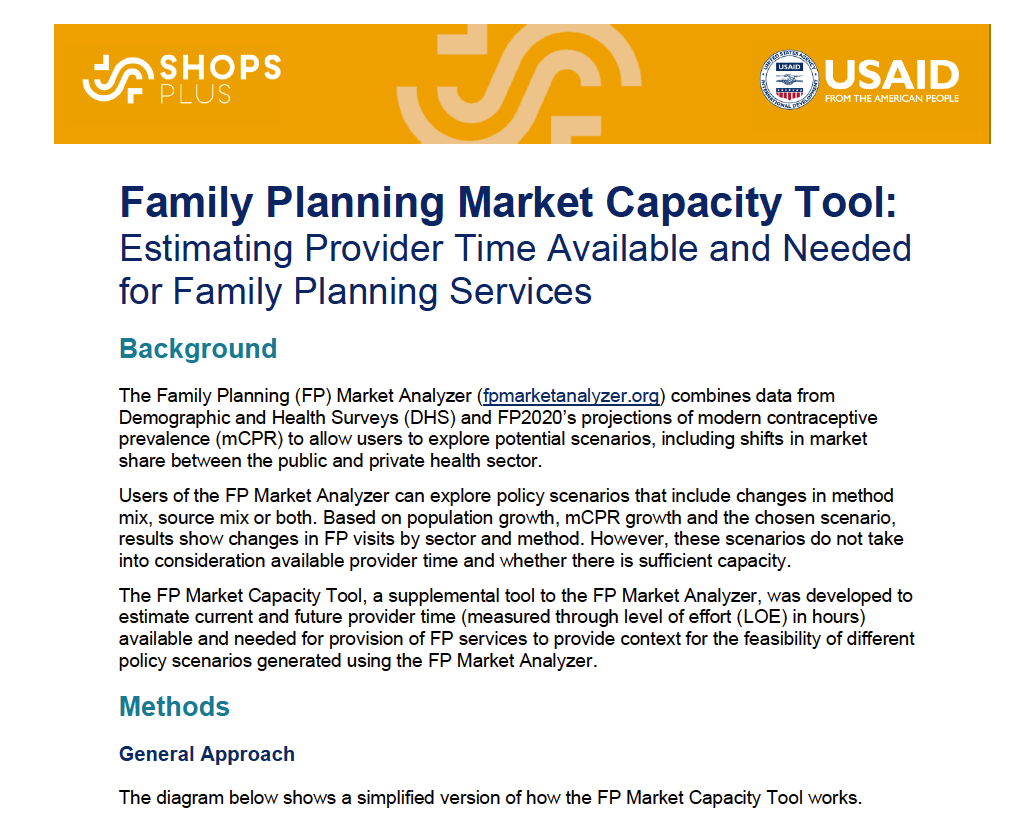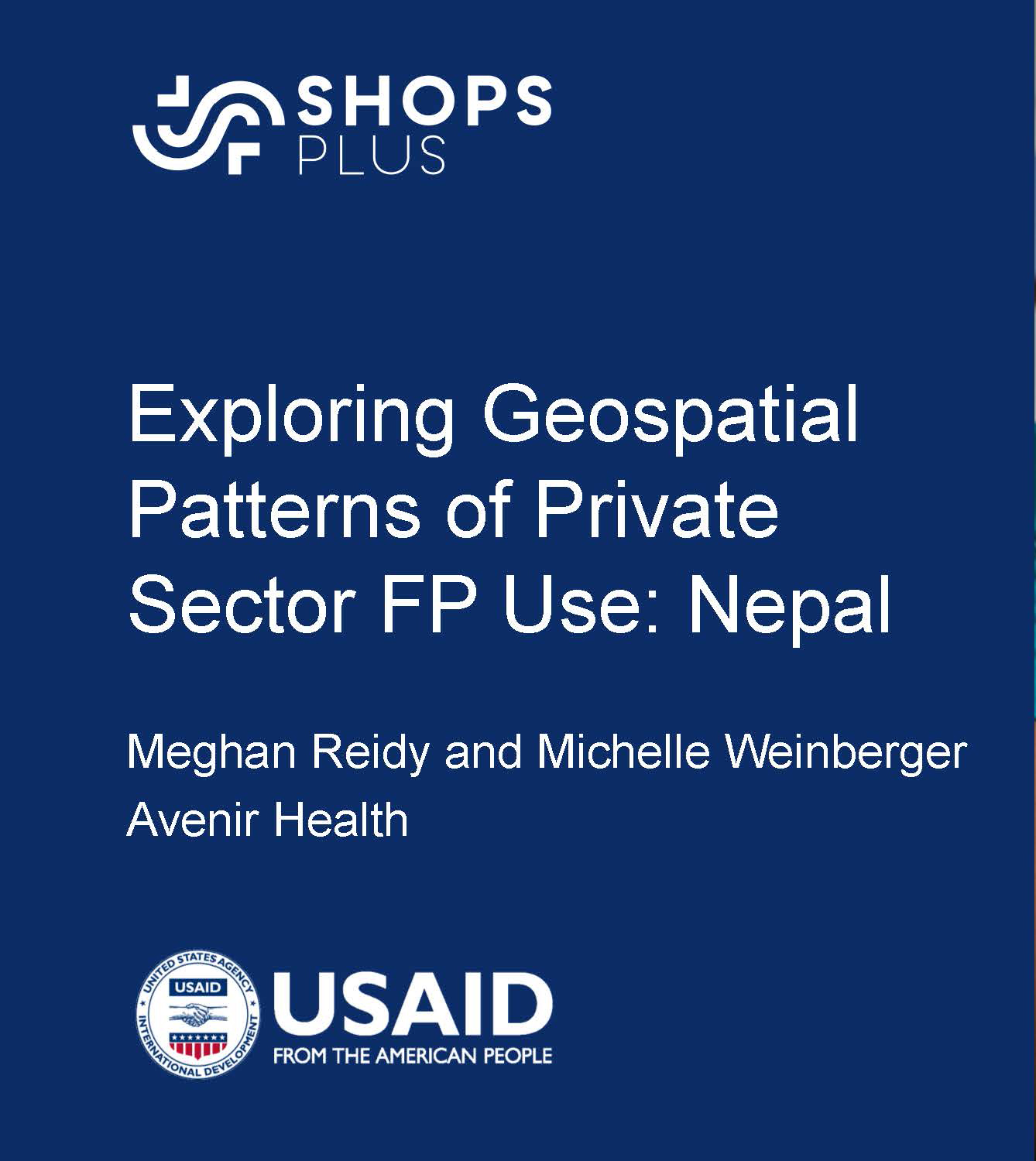
Using Market Size Estimation to Identify Family Planning Opportunities in Nepal
In 2023, FHM Engage conducted an analysis of the family planning (FP) market in Nepal to diagnose root causes of market under-performance. The resulting Nepal market description revealed the need for improved market intelligence data, particularly for private sector actors in the contraceptive product market. While the market description identified provinces and demographic groups in which FP uptake has fallen behind, the lack of more detailed subnational market intelligence poses a major obstacle to strengthening private sector engagement in increasing access to and use of modern contraceptive products. Data pertaining to the supply and demand of contraceptive products and services is often unavailable, of poor quality, or too sparse. Consequently, FHM Engage applied an estimation approach that was developed and tested under the project in Tanzania. This activity in Nepal aims to enable market actors to identify geographic areas of opportunity for improving the provision of modern contraceptives by understanding where demand for different contraceptive products and services exists and allows for better targeting of interventions and products. It also provides market actors with a quantification of current and potential private sector contraceptive product volume, and real dollar value, to spur interest and action from a commercial perspective. Read the full market sizing report or view the corresponding slide deck.
Banner image: An owner of a private pharmacy in Bardibas, Madhesh Province, Nepal, assists a young client in purchasing family planning products. Photo Credit: Pramin Manandhar, FHI 360
Recent Highlights
-
Written by :
-
Published on : 21-Jan-25
- Highlight Type : News
- Country :
- Project : FHM Engage
- Language : English

Resource Library
Exploring Opportunities for Private Sector Family Planning Growth in Nepal: An Analytic Approach Market Size Estimation Presentation
Resource Type : Presentation
Country : Nepal
Year : 2025-01-21T06:37:09
Language : English
Project : FHM Engage

Resource Library
An Innovative Approach to Identify Family Planning Market Opportunities by Measuring and Visualizing Sub-market Size in Nepal
Resource Type : Report
Country : Nepal
Year : 2025-01-16T05:49:42
Language : English
Project : FHM Engage
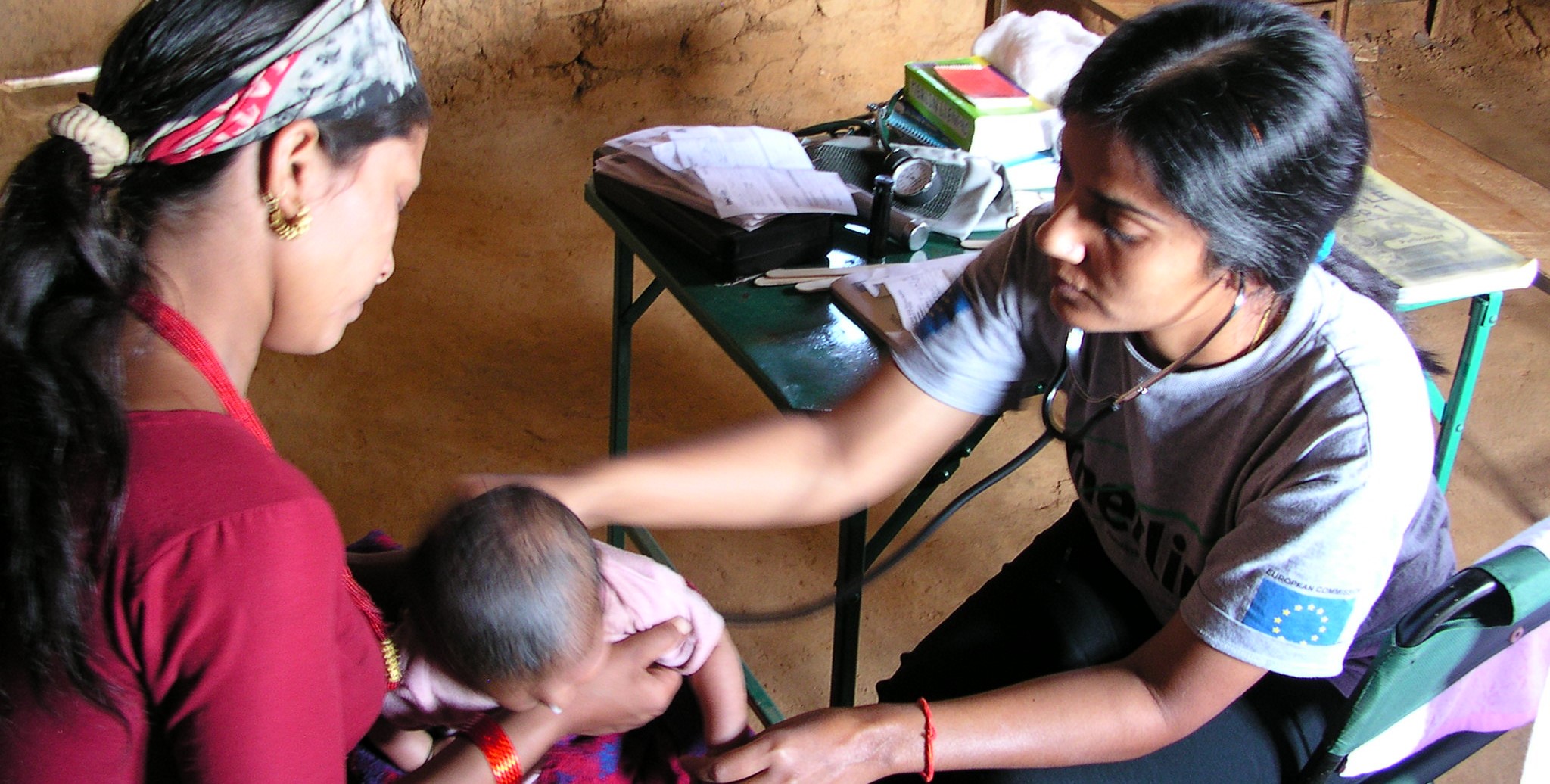
Healthy Markets CoP Session - Nepal - June 2024

FHM Engage is the Secretariat for the Healthy Markets Community of Practice (HMCoP). The current co-chairs are USAID (represented by Andrea Bare) and UNFPA (represented by Ben Light). The HMCoP is an evolution from the Total Market Approach Technical Working Group (TMA TWG) which has been operational since 2014.
June 27, 2024 Meeting: Nepal
The June Healthy Markets Community of Practice (HMCoP) meeting focused on Nepal. We would like to thank FHM Engage Senior Market Development Advisor Shankar Narayanan for all his hard work in helping to organize this meeting and USAID Nepal Family Planning, HIV, Supply Chain Management and Social Marketing Team Leader Ivana Lohar, for her engagement and contributions. We are happy to welcome back Results for Development Fellow Farhan Yusuf as co-facilitator of the HMCoP. Farhan previously served as FHM Engage Chief of Party for Tanzania. As co-facilitator Farhan will engage members, facilitate sessions, and serve as a point of contact for the group. Farhan will also lead some of our communications and analysis efforts moving forward.
To open the session, UNFPA Senior Technical Advisor Ben Light provided context on the current family planning (FP) landscape in Nepal and globally. In Nepal, modern contraceptive prevalence rates (mCPR) have stalled, there has been an increase in the use of traditional methods and an increase in abortion, and the total fertility rate (TFR) is on a downward trajectory. Globally, donor funding is also down, and governments are increasingly being encouraged to allocate more domestic resources to meet FP financing needs. While challenging, these factors present a significant opportunity for the commercial sector and demonstrate a need for an improved market environment to enable the private sector to help national efforts to achieve family planning.
In the next part of the meeting, speakers gave brief presentations on their work.
Shankar Narayanan, Senior Technical Advisor for Market Development, FHM Engage, provided an overview of FHM Engage’s recent findings from the Nepal FP market description findings. One interesting takeaway is that the TFR has decreased in Nepal over the last 15 years, even while the mCPR remains flat and with an increased proportional use of traditional methods. Additionally, the four most recent demographic and health surveys (DHS) show a stagnant mCPR and a slight decline in the proportion of women wanting to get pregnant but did not use contraception, along with a decline in the TFR. This decline could be due to a reduced need for contraception as a result of infrequent sex, an increase in induced abortion, or even because husbands are away from the home which is a common occurrence in Nepal.
In analyzing the private sector, major takeaways are that: 1) local manufacturing of FP products is lacking; 2) pricing is a key issue for the scale-up of 3rd and 4th generation oral contraceptive pills (OCP), subcutaneous depot medroxyprogesterone acetate (DMPA-SC), and implants; and 3) there is a lot of room for the private sector to expand choice in short-acting methods (SAM) and long-acting reversible contraceptives (LARC). The market description also found that there is the potential for a 20 to 30 percent increase in the value of private sector sales and that local manufacturing of FP products is an emerging opportunity for the country.
Navaraj Bhattarai, Program Analyst for FP/Reproductive Health Supplies Coalition (RHCS) at UNFPA Nepal, spoke on supporting and promoting sustainable financing in FP, and on bridging access to and availability of quality FP services for women and girls. Although the mCPR rate is stagnant there has been little change in the rate of unmet need. UNFPA is working on improving availability by expanding LARCs through capacity building, deploying visiting service providers, roving auxiliary nurse midwives (ANM), and voluntary surgical contraception (VSC+) camps while also expanding a broad range of choices at all levels of health facilities (HF). In Nepal, UNFPA is working to increase contraceptive choice, but more work needs to be done as less than half of health facilities still do not provide implants and, in most cases, LARCs are being provided by the public sector. If Nepal can utilize the private sector, then there is a real opportunity for the private sector to play a significant role in increasing access to implants.
Vishal Takarkhede, Assistant General Manager for Senador Laboratories, discussed launching quality assured, new FP products and improving the availability of youth-focused brands. Senador is present in around 70 countries, is a major supplier of OCPs in emerging markets, and is providing access to approximately 16M women of reproductive age annually. In Nepal, the company has four products (two COCPs [combined oral contraceptive pill], one injection, and one emergency contraception [ECP]). Senador recently completed a market survey last year to facilitate the launch of a new product. The survey revealed interesting findings around awareness, availability, prescription patterns, and purchasing power. Moving forward Senador would like to work more closely with organizations in the areas of registration support, facilitating partnerships and collaboration with health care providers, (HCP), community outreach to target rural and underserved areas, building capacity for HCPs, and improving monitoring and evaluation to improve outreach efforts. Future collaboration with companies like Senador Laboratories will provide valuable opportunities to develop the FP market in Nepal.
Suzanne Reier, Chief of Party for CARE Nepal, focused on USAID Nepal’s Adolescent Reproductive Health (ARH) project, which works with the Government of Nepal, the private sector, relevant stakeholders, and young people to support adolescents in Nepal to reach their full capacity by choosing and practicing healthy reproductive behaviors. ARH is a five-year project working with the Association of Youth Organisations Nepal, Howard Delafield International, Nepal CRS Company, Jhpiego, and CARE in 60 municipalities across 11 districts in Karnali, Lumbini, and Madhesh provinces. A survey done by the project found that demand exists for the private sector as people, particularly adolescents, believe it provides higher quality services and more privacy. ARH’s major activities include private health facility mapping, capacity building, quality improvement, logistical support, and digital interventions. The project is also working to create demand through social behavior change and social norms related interventions, youth engagement, and digital innovations. To date, the project has found that private facilities need to do more outreach and provide incentives to increase their consumer base. Facilities also need to do more to balance the quick and confidential aspects that adolescents say they prefer with providing the more time-consuming aspect of counseling, to ensure that adolescents are equipped with the right information.
Jiblal Pokharel, Managing Director for Nepal CRS Company (CRS), focused on improving the availability and accessibility of contraceptives in Nepal. CRS implements donor-funded targeted social marketing interventions and works to engage private sector pharmacies, clinics, and hospitals to increase the accessibility and availability of contraceptives in Nepal. CRS products are available in more than 20,000 pharmacies and in 2021 CRS Healthcare (CRSH) was established as a financially self-reliant sales and marketing subsidiary of FP and other health products. Jiblal began the presentation with some country context on a few key FP indicators which included general contraceptive use in married women ages 15 to 49 and sources of modern contraceptive methods. This data showed that 69 percent of these current users of modern methods are getting their contraceptives from the public sector while only 23 percent are from the private sector. In the public sector, implants, injectables, and intrauterine devices (IUCD) are predominant, while the private sector is dominated by male condoms and pills. This divide shows that there are real growth opportunities for the private sector in the FP market.
Srishti Shah, Senior Specialist for Communication, Documentation, and Knowledge Management at FHI 360, spoke on behalf of MOMENTUM Private Healthcare Delivery (MPHD) Nepal on digital interventions applied in the private sector context. The goal of MPHD Nepal is to improve the technical capacity and business acumen of private sector health facilities to sustain the availability of high-quality FP services. Started in 2021, MPHD Nepal consists of FHI 360, PSI Nepal, and CRS Company working in six provinces, 67 municipalities, and 848 pharmacies, clinics, and/or hospitals. In the country there is currently a high unmet need among married women combined with the fact that the private sector supplies 23 percent of FP services (68 percent male condoms and 49 percent pills). The program is working to improve technical and business capacity and also focuses on digital interventions for quality FP service. The interventions combine FP service data from the district health information software (DHIS2) and Gunastar Sewa, a locally developed web-based application to create automated dashboards. Provider-facing dashboards allow for prompt data-based decision-making while program-facing dashboards allow for local implementing partners and the program team to support rapid adaptive management. Automated dashboards allow for continued utilization of data despite reduced intensity of support. There are challenges in this approach as some providers or owners have expressed trouble using the digital applications. However, as the dashboards implement adaptive management in real-time, and the applications are locally developed, tailor-made solutions are possible. When incorporating digital interventions, it is important to remember that they require continuous innovations and adaptation, both to understand what the private sector values and to keep the private sector in the center of the design thinking.
Ivana Lohar, Team Leader for Family Planning, HIV, Supply Chain Management and Social Marketing at USAID Nepal gave concluding remarks and reiterated the importance of engaging the private sector. She highlighted that each organization featured during this HMCoP contributes to different areas of the FP market through varied interventions, but that ultimately all are engaging the private sector and looking for local solutions. A key takeaway is that working together and coming up with sustainable solutions is essential to improve FP in Nepal.
To end, we extend a great thanks to all who took part in this session focused on Nepal, particularly to those who took the time to speak and prepare slides.
Resources: Be sure to visit our webpage! On the USAID Health Market Links website, managed by FHM Engage, you can find past session recordings, slide decks, or revisit past newsletters. See the HMCoP page here: Healthy Markets CoP | FHM Engage (healthmarketlinks.org). For more information on the Nepal Market Description please visit the Resource Library | FHM Engage (healthmarketlinks.org)
Future Meetings: At the end of our meeting, it was announced that the next convening of the HMCoP will occur in July and focus on Zambia. However, we have decided to postpone this session to August to accommodate participants' summer leave schedules and increased workload over this period. The meeting will now take place on August 29 from 9:00 am-10:30 am EDT / 3:00 pm-4:00 pm CAT.
The HMCoP would like to highlight the plan to hold more thematic meetings in the coming year. Some possible topics include pharmacy and drug shops, youth, and access to private capital. If there are other topics that you would like to propose, or if you would like to contribute to these sessions, please email Elizabeth Peña at (epena@FHM-Engage.org) or Judy Mboya (jmboya@fhm-engage.org).
The team would also like to share the tentative schedule for the rest of 2024. If you would like to take part in or contribute to any future sessions, or you would like to make us aware of an organization or project to feature, please email Elizabeth Peña at (epena@FHM-Engage.org) or Judy Mboya (jmboya@fhm-engage.org).
- August- Zambia
- September- Sierra Leone
- October- Malawi
- November/December- Pharmacy & Drug Shops
Questions? Please email Judy Mboya (jmboya@fhm-engage.org or Elizabeth Peña (epena@FHM-Engage.org).
Banner photo: A female health worker examines a baby, held by its mother, at a Merlin mobile clinic in Nepal. Photo Credit: Merlin Photostream from USAID Flickr
Recent Highlights
-
Written by :
-
Published on : 16-Jul-24
- Highlight Type : News
- Country :
- Project : FHM Engage
- Language : English
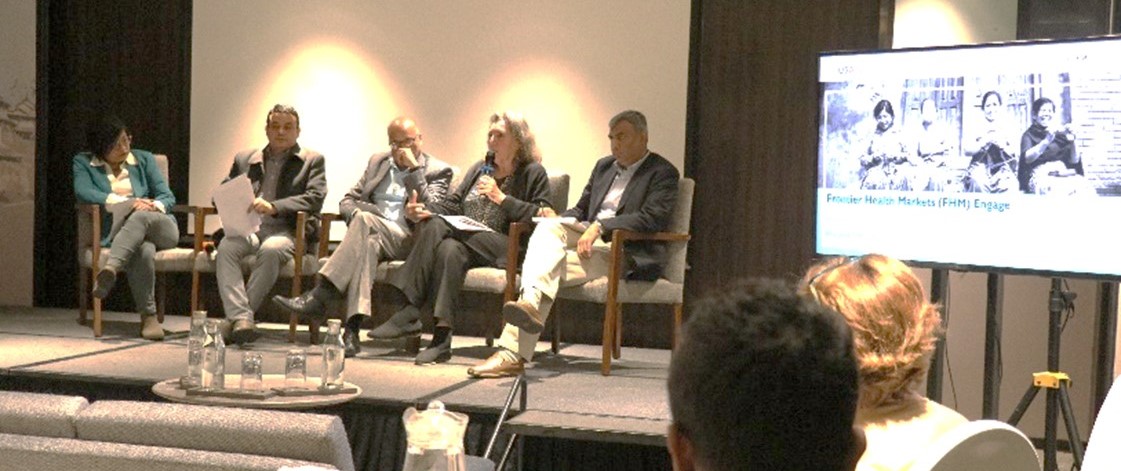
FHM Engage Provides Family Planning Market Description Insights in Nepal
In early March 2024, FHM Engage Project Director Dana Tilson and Senior Market Development Advisor Mr. Shankar Subramaniem traveled to Nepal to support FHM Engage Commercial Expansion Strategies and Segmentation Analysis and to disseminate insights from the Nepal Family Planning Market Description, identify entry points for commercial actors, and inform pricing and distribution strategies of social marketing organizations (SMOs). The intended focus expanded to include an analysis of rules and regulations to recommend adaptations for addressing market development gaps.
During their travel, our FHM Engage colleagues engaged in strategic meetings with esteemed partners and key stakeholders such as CRS Healthcare, including sessions with USAID/Nepal. They facilitated a dissemination event to share project insights, progress, and outcomes, emphasizing presenting findings from the Nepal market description and rules analysis, thereby underlining the importance of their contributions.
On March 12, 2024, FHM Engage convened a workshop to disseminate market sizing analysis and co-design strategies to encourage private sector participation. The aim was to enable informed decisions by private sector and social marketing actors regarding product categories and geographic distribution to enhance access to family planning (FP) products.
Following the dissemination, FHM Engage will continue to explore methods to assess the uptake of market intelligence, beginning with market actors' self-reported understanding and utilization of the information.
This collaborative effort seeks to empower market actors with comprehensive insights into market dynamics and regulatory frameworks, ultimately fostering sustainable growth and efficiency while improving market equity and accessibility to essential products.

Related Resource:
Recent Highlights
-
Written by :
-
Published on : 19-Apr-24
- Highlight Type : News
- Country :
- Project : FHM Engage
- Language : English
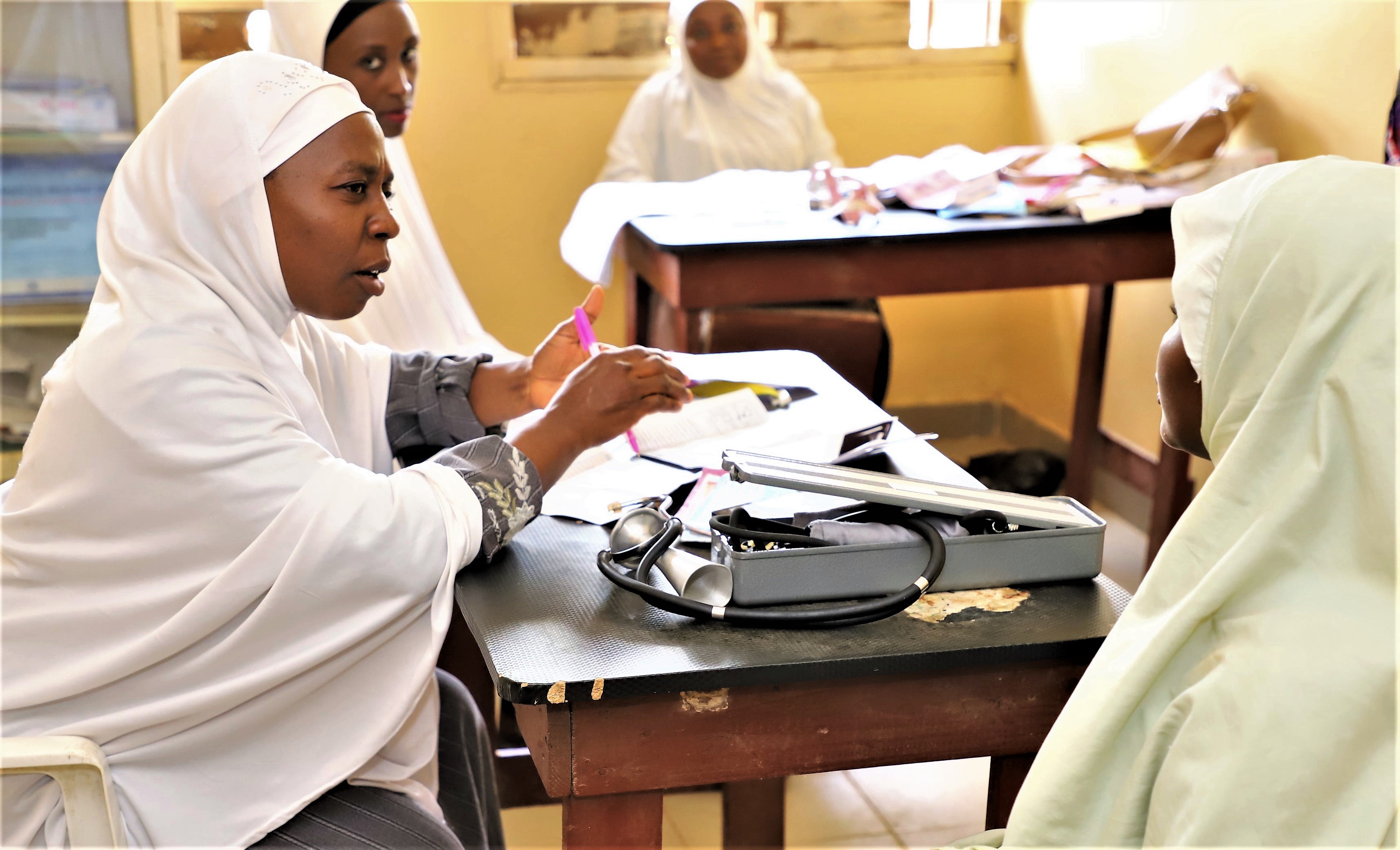
FHM Engage Conducted Market Descriptions in India, Kenya, Liberia, Madagascar, Nepal, Nigeria, Pakistan
FHM Engage uses a market development approach (MDA) to understand a country’s health market system. The MDA allows us to diagnose root causes of market under-performance, such as restricted supply of and consumer demand for health products and services. FHM Engage supports local public and private market actors to design locally informed strategies and solutions that improve market systems, including core functions of supply and demand and supporting functions that strengthen the enabling environment for market growth.
As a critical foundational step to the MDA, FHM Engage compiled detailed market descriptions in India, Kenya, Liberia, Madagascar, Nepal, Nigeria, Pakistan. Review them here:
INDIA
FHM Engage India Market Description 2023
FHM Engage India Market Description 2023 (Abridged)
Health Market Description Brief on Family Planning in India
KENYA
FHM Engage Kenya Market Description 2023
LIBERIA
FHM Engage Liberia Market Description 2023
FHM Engage Liberia Market Description 2023 (Abridged)
MADAGASCAR
In Madagascar, we completed three market descriptions: Family Planning; Maternal & Child Health; Nutrition
NEPAL
FHM Engage Nepal Market Descriptions 2023
NIGERIA
In Nigeria, we compiled six market descriptions in the two states of Ebonyi and the Federal Capital Territory (FCT): Ebonyi Child Health; Ebonyi Family Planning; Ebonyi Maternal Newborn Health; FCT Child Health; FCT Family Planning; FCT Maternal Newborn Health
PAKISTAN
FHM Engage Pakistan Market Description 2023
Related Resources:
‘How-to’ Guidance: Executing the Diagnosis Phase of a Market Development Approach
MDA Overview Briefs:
MDA Course Curriculum:
Market Development Approach (MDA) 2023 course curriculum
Course brief #3 What are key terms used in a market development approach for health?
Recent Highlights
-
Written by :
-
Published on : 03-Apr-24
- Highlight Type : News
- Country : , , , , ,
- Project : FHM Engage
- Language : English

Resource Library
Nepal Market Description 2023
Resource Type : Presentation
Country : Nepal
Year :
Language : English
Project : FHM Engage

Resource Library
Family Planning Market Capacity Tool: Estimating Provider Time Available and Needed for Family Planning Services
The Family Planning (FP) Market Analyzer (fpmarketanalyzer.org) combines data from Demographic and Health Surveys (DHS) and FP2020’s projections of modern contraceptive prevalence (mCPR) to allow users to explore potential scenarios, including shifts in market share between the public and private health sector. Users of the FP Market Analyzer can explore policy scenarios that include changes in method mix, source mix or both. Based on population growth, mCPR growth and the chosen scenario, results show changes in FP visits by sector and method. However, these scenarios do not take into consideration available provider time and whether there is sufficient capacity.
The Family Planning Market Capacity Tool was developed to estimate current and future provider time (measured though level of effort (LOE) in hours) needed for provision of family planning services to provide context for the feasibility of different shifts in method mix and market share between the public and private health sector. The FP Market Capacity Tool should be seen as a starting place for conversations about what the current health infrastructure looks like within a country, and how that relates to the potential feasibility of different future scale up plans. In addition, other considerations need to be taken into account beyond simply the availability of provider time, including training and quality assurance, client and provider preferences, and the affordability of services, especially within the private sector.
This tool has been pre-populated with data for 7 countries for which sufficient data on health care infrastructure in both the public and private sector could be found: Bangladesh, DRC, Haiti, Kenya, Malawi, Nepal, and Senegal.
Resource Type : Brief
Country : Bangladesh, Democratic Republic of Congo, Haiti, Kenya, Malawi, Nepal, Senegal
Year : 2021-09-28T15:00:00
Language : English
Project :

Resource Library
Exploring Geospatial Patterns of Private Sector FP Use: Nepal
Existing tools allow for exploration of patterns of public and private sector contraceptive use segmented by key demographics such as age, marital status, or urban/rural residence. While useful to understand differentials in the use of the public and private sector, these approaches do not provide a view into geographic differences across a country. Utilizing an approach known as small area estimation, SHOPS Plus has developed a series of "heat maps" for five countries that explore how contraceptive use and use of the public and private sectors varies across a country. Maps provide both relative views (e.g., the share of women using the private sector) and absolute views (e.g., the number of women using the private sector) as both can be useful for different advocacy and planning needs. Maps also overlay useful contextual information such as the location of cities, towns, roadways and health facilities. The five countries covered by this work are: Guinea*, Kenya, Nepal, Uganda, and Tanzania.
*Guinea analysis also includes select Child Health indicators
Resource Type : Presentation
Country : Nepal
Year : 2021-09-02T14:30:30
Language : English
Project : SHOPS Plus

Resource Library

EOP series: Accelerating private sector engagement: What the future holds
During this webinar, the last in the end-of-project series, leaders from the project reflected on results and implications. With special guests from USAID, FP2030, and the David and Lucile Packard Foundation exploring what the future holds. Susan Mitchell, project director for SHOPS Plus, opens the webinar with an overview of the projects acheivements.
Since 2015, SHOPS Plus has sought to harness the full potential of the private sector and catalyze public-private engagement to improve health outcomes and increase access to family planning, HIV/AIDS, maternal and child health, and other priority health services.
Moderator:
- Caroline Quijada, Deputy Project Director, SHOPS Plus, Abt Associates
Speakers:
- Mbogo Bunyi, Senior Private Sector Advisor, SHOPS Plus, Abt Associates
- Ramakrishnan Ganesan, Senior Private Sector Advisor, SHOPS Plus, Abt Associates
- Jeanna Holtz, Health Financing Director, SHOPS Plus, Abt Associates
- Emily Mangone, Digital Health Specialist, SHOPS Plus Abt Associates
- Michelle Weinberger, Modeling and Segmentation Advisor, SHOPS Plus, Avenir Health
Guest speakers:
- Chonghee Hwang, Director, Country Engagement and Transition (Africa and Asia), FP2030
- Kuyosh Kadirov, Senior Private Sector Advisor, U.S. Agency for International Development
- Anand Sinha, Country Advisor, India, the David and Lucile Packard Foundation
Resource Type : Webinar
Country : India, Madagascar, Nepal, Senegal, Tanzania
Year : 2021-07-20T13:00:00
Language : English
Project :
Pagination
- Page 1
- Next page


